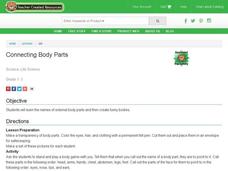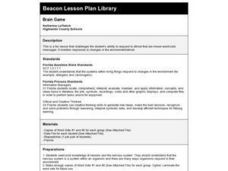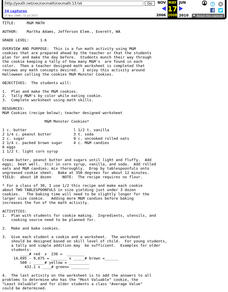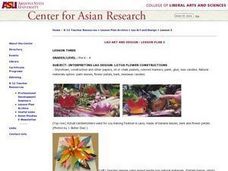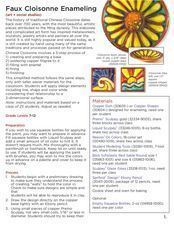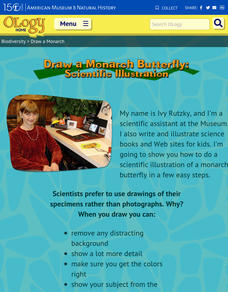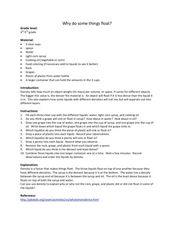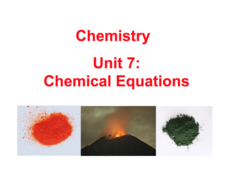Curated OER
March Into Shamrock Season
Students use St. Patrick's Day activities to explore symmetry and words. In this lesson about St. Patrick's Day, students experience the Irish culture by learning about the Irish shamrock, and learning some Irish words. Students create...
Curated OER
Science: Where the Worms Live
Students build mine-earthworm habitats to discover their niche in them. They make predictions about what the niche looks like in a week and draw a picture of it. Students notice the tunnels in the soil and how the sand and dirt are now...
Curated OER
Connecting Body Parts
Students identify body parts. For this human body lesson, students play a game in which they point to body parts called out by the teacher. Students draw, label, and assemble body parts made from construction paper. Students create...
Curated OER
Tempera/chalk painting
Third graders investigate and accurately interpret with cupporting evidence the artwork of Claude Monet. They choose what they will paint. Students draw a rough draft on paper. They produce interseting looking "brush strokes", where...
Curated OER
Colors: Primary and Secondary
Students explore primary and secondary colors. In this lesson on light and color, students complete four different activities which include mixing colors, creating secondary colors from primary colors and observing the colors in a bubble.
Curated OER
M&M Cookie Math
Students munch their way through a cookie keeping a tally of how many M&M's are found of each color.
Curated OER
Making Summer School Less of a Drag
Teaching summer school is the perfect opportunity for experimenting and expanding your classroom repertoire.
Virginia Department of Education
Properties of Compounds and Chemical Formulas
Young chemists have unknown compounds they need to sort. Performing three different tests on each, the chemical behaviors they observe become the basis for data analysis.
Cornell University
Predicting Chemical Reactions
Prove the Law of Conservation of Mass through a lab investigation. A well-designed lesson asks groups to combine materials and monitor indicators for chemical reactions. Measuring the mass of the reactants and products allows individuals...
Curated OER
Lao Design: Lotus Flower Constructions
Students create lotus flowers in 3-D designs applying Lao art techniques. Following a teacher demonstration, they assemble their own lotus flower candleholders and the teacher arranges a group flotation in a body of water. Students...
Curated OER
Faux Cloisonne Enameling
Middle and high school students engage in enameling and apply design elements. They study the history and tradition of Cloisonne. The history of traditional Chinese Cloisonne dates back over 700 years, with the most beautiful, artistic...
Cornell University
Chemical Reactions
Investigate the Law of Conservation of Mass through a lab exploration. Individuals combine materials to initiate chemical reactions. They monitor for signs of reactions and measure the masses before and after the reactions for...
American Museum of Natural History
Draw a Monarch Butterfly: Scientific Illustrations
One doesn't have to be an artist to appreciate nature. A thorough resource shows pupils how to create detailed illustrations of a monarch butterfly. The lesson highlights the benefits of creating scientific drawings as opposed to simply...
American Museum of Natural History
All About Horses
Horses come in all shapes and sizes, but all belong to the same species. Young scholars explore the different traits and connect the information to genetic modification. The interactive gives them the option to read about 18 different...
Center for Technology in Teaching and Learning
CSI: The Experience - Family Forensics
Forensic scientists depend on their observation skills to analyze evidence down to the molecular level. Middle and high schoolers practice making observations and predictions with a series of crime scene activities, which includes a...
Curated OER
April Showers Raindrop Painting
I love this idea! After discussing rain, spring, and the weather, take your class outside and let nature do the painting. They shake power paints and glitter onto a piece of heavy construction paper, then take their paper outside and...
Curated OER
Why Do Some Things Float?
Young scholars recognize that density determines whether objects sink or float. In this sink or float lesson, students experiment with plastic in three liquids. young scholars drop their objects into the liquids and observe and...
Curated OER
Ukrainian Style Scratchboard Eggs
The class explores Ukrainian motifs, the scratchboard technique, and two-dimensional art. They design and produce a Ukrainian style egg with tagboard, crayon, tempera paint, and a stylus. Ukrainian egg designs are similar to those used...
Polar Trec
Nature's Density Column
Nature provides density columns in the polar regions that provides food for many animals. Young scientists build their own density columns with water in order to answer analysis questions. Through a slideshow presentation, scholars...
Curated OER
Lots of Leaf
In this science worksheet, students read and analyze information about leaves. Students will consider the 5 questions: How is a leaf like a cook? How is a leaf like a fan? How is a leaf like a pair of lungs? How does a leaf affect the...
American Chemical Society
Exploring Baking Powder
Meant to follow an activity in which young chemists identified an unknown substance by chemical reactions, they now take their data and use it to determine which materials combine to make up baking powder. This lesson is one that can be...
Normal Community High School
Chemical Equations
Viewers learn how to identify the substances in a chemical reaction, how to balance it, and the different types of chemical reactions by watching a presentation that also includes a review of monomers and polymers. The presentation...
Curated OER
Volcano Demonstration
Students watch a demonstration on how volcanoes work. In this volcano demonstration, students watch the teacher demonstrate a volcanic eruption. The teacher will change variables used to create the eruption and the students will predict...


